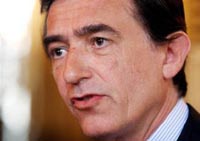Philippe Douste-Blazy calls for cease-fire between Israel and Hezbollah
It was his third visit to Beirut since Hezbollah kidnapped two Israeli soldiers on July 12, triggering an Israeli offensive against Lebanon that has killed hundreds of people, mostly civilians.

An Israeli airstrike early Sunday on a three-story building in the southern town of Qana killed 56 people, most of them women and children still asleep at the time, according to Red Cross officials and Lebanese police.
French Prime Minister Dominique de Villepin on Monday called Israel's temporary suspension of airstrikes "a first step, but an insufficient step, given the current stakes."
Villepin, speaking outside Paris, repeated French calls for an immediate cease-fire, calling such a halt to fighting a "necessary condition to alleviate the intolerable suffering of citizens."
The U.N. Security Council called Sunday for an end to the violence in Lebanon and expressed "extreme shock and distress" at Israel's Qana airstrike, but stopped short of condemning it.
Despite strong support from many council members for an immediate cease-fire, the statement only called for an end to violence and an urgent long-term solution to the fighting between Israel and Hezbollah guerrillas.
Douste-Blazy said France "would have preferred a stronger statement" that calls for an immediate cease-fire.
Lebanon's President Emile Lahoud also criticized the Security Council.
France, which has historic ties to Lebanon, has taken an active role in the effort to broker an end to the latest fighting in the Middle East, the AP reports.
Over the weekend, it circulated a draft U.N. resolution among Security Council members that would call for an immediate halt to fighting. The United States and Britain have also called for a resolution - but one that would deploy an international force without a cease-fire first.
Subscribe to Pravda.Ru Telegram channel, Facebook, RSS!


